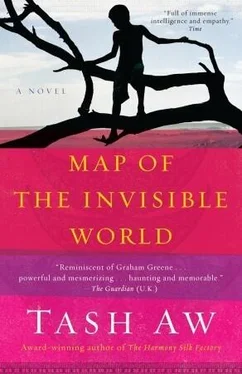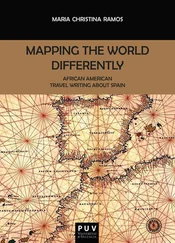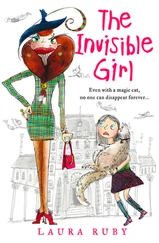Tash Aw - Map of the Invisible World
Здесь есть возможность читать онлайн «Tash Aw - Map of the Invisible World» — ознакомительный отрывок электронной книги совершенно бесплатно, а после прочтения отрывка купить полную версию. В некоторых случаях можно слушать аудио, скачать через торрент в формате fb2 и присутствует краткое содержание. Год выпуска: 2010, Издательство: Spiegel & Grau, Жанр: Современная проза, на английском языке. Описание произведения, (предисловие) а так же отзывы посетителей доступны на портале библиотеки ЛибКат.
- Название:Map of the Invisible World
- Автор:
- Издательство:Spiegel & Grau
- Жанр:
- Год:2010
- ISBN:нет данных
- Рейтинг книги:4 / 5. Голосов: 1
-
Избранное:Добавить в избранное
- Отзывы:
-
Ваша оценка:
- 80
- 1
- 2
- 3
- 4
- 5
Map of the Invisible World: краткое содержание, описание и аннотация
Предлагаем к чтению аннотацию, описание, краткое содержание или предисловие (зависит от того, что написал сам автор книги «Map of the Invisible World»). Если вы не нашли необходимую информацию о книге — напишите в комментариях, мы постараемся отыскать её.
comes an enthralling novel that evokes an exotic yet turbulent place and time—1960s Indonesia during President Sukarno’s drive to purge the country of its colonial past. A page-turning story,
follows the journeys of two brothers and an American woman who are indelibly marked by the past — and swept up in the tides of history.
Map of the Invisible World — читать онлайн ознакомительный отрывок
Ниже представлен текст книги, разбитый по страницам. Система сохранения места последней прочитанной страницы, позволяет с удобством читать онлайн бесплатно книгу «Map of the Invisible World», без необходимости каждый раз заново искать на чём Вы остановились. Поставьте закладку, и сможете в любой момент перейти на страницу, на которой закончили чтение.
Интервал:
Закладка:
“You’re on a losing wicket, darling. This is a country of more than a hundred million people. Why should any Indonesian care about some solitary white guy who’s gone AWOL when they’re dying of hunger and on the brink of a civil war? The Dutch are ancient history in this country, can’t you see? Even if your guy is in Jakarta — and there’s no guarantee he is — we still need to find him in the biggest, dirtiest, most wretched and corrupt city in the world. There is no chance.”
“That’s always been your problem,” Margaret said, raising her voice. She felt curiously energetic; the stiffness in her neck had ceased to bother her and she was no longer feeling lethargic. “You’ve always just accepted the way things are, you just go with the flow. Ever since I’ve known you, that’s been the way you are. It’s so damn frustrating. What is it you used to say to me when we first met? ‘L’action c’est pas la vie , so why bother?’—or some bullshit like that.”
“Actually it was ‘L’action n’est pas la vie, mais une façon de gâcher quelque chose, un énervement.’ It’s from Rimbaud.”
“Whatever. That’s why you’re still a third-rate hack, stringing for the mediocre newspapers of the world. You have a brilliant mind and you’re in one of the hottest political climates in the world — and still you refuse to get your act together. We can find Karl. It can’t be that difficult. Come on. You’ve got scores of contacts in Jakarta. Call your journalist friends. I’ll speak to people I know, I’ll sniff around — I have a nose for these things. We’ll find him. Don’t be so defeatist. And will you stop picking at that bottle, please?”
“You haven’t told me why this Karl de Willigen is so important to you. I presume he’s the long-lost love you never confessed to having had.”
Margaret looked him squarely in the eye and contemplated telling him the whole truth: how she sometimes woke up in the night and remembered exactly the way Karl looked in the half-light of a Balinese dusk; how she remembered being sixteen and in love, knowing that she would be clinging to her memories a quarter of a century later. She said, “It’s complicated, Mick. We were very close friends. He must have represented something to me, though I’ve never figured out what, exactly. But do you really think I’m the sort of woman who pines after a man? Get a grip on yourself, Mick Matsoukis. I’m doing it for the boy. I want him to get his father back. Don’t you?”
“Speaking of which, what are we going to do with the boy?”
Margaret paused before replying. Her initial instinct was to keep Adam by her side every moment of the day. She had not felt at ease leaving him on his own at home. He was too vulnerable, too helpless. But the thought of losing him was even more frightening. “He stays here,” she said, dropping her voice. “It’s too dangerous having him with us. Maybe I’ll call Din and ask him to look after the kid. Let’s just get through today and see how we make out.”
Daybreak over Jakarta was swift and uneventful, the darkness of the night sky replaced decisively by its murky daytime haze; noncolor substituted noncolor in a quick, perfunctory sweep. There was no ceremony, no lingering moment of aching beauty during which one might reflect on life and love, or yearn for things lost, or things as yet unrealized. The change was ruthless and efficient and unsentimental — typically Asian, thought Margaret. She liked it that way. She was no longer a prisoner of the night and all its limitations. In the intense days of this city she could accomplish anything she set out to do.
“I’ll check in with you later this afternoon,” she said, starting to make herself a cup of coffee. “And remember, Mick: This is your big chance too. The mother of all stories is just around the corner, and it’s got your name written all over it.”
THE WHOLE CITY seemed to be clad in the Merah Putih . The stark scarlet and white of the young republic hung from every window and lined the streets on hastily erected flagpoles. It adorned the city in every conceivable manner: Giant banners hung veil-like over entire facades of buildings; streams of tiny flags were strung up high over the roads, fluttering in the wind like starlings on a wire; municipal workers painted huge, stylized murals — one featured a waterfall that swirled and cascaded its river of red white water on to the beholder; trucks were painted half-red, half-white; little girls wore red and white rib bons in their hair and ate red and white bonbons; young men riding three to a single motorbike wore bandannas of red or white that trailed behind them and made them look like warriors as they weaved through the red white traffic on the red white roads. And the president’s face was everywhere, proudly regarding his red white city, at once virile and benign — and a good few years younger than he was, perfectly preserved at that moment of independence in ’45. At least it brought relief to the grayness, Margaret thought, but it was already beginning to seem dull to her. She had seen thirteen Independence Day celebrations, each one grander and more lavish than its predecessor, marked by the construction of a grandiose “gift” to the nation, some useless futuristic monument or stadium or theme park. She had become inured to it all, familiar with the grotesque. She remembered — with no sense of regret, just a tinge of sorrow — how those first Independence Days had seemed so exciting, so full of promise. She was newly arrived from Europe and her whole life was waiting to be rebuilt, much like this new country with its young president. She had been ready for change, ready for the task ahead of her, and so had they. She looked around this city now: They had lost their way, but she would not allow herself to be dragged away with it.
She tried to remember how she’d felt back then — not just how she or the city had looked, but the optimism she had felt. The physical scenes were easy enough to recall. The streets were muddy and barely covered with tarmac; even the center of the city seemed to be filled with kampungs that ran indistinctly into one another, clustered on the edge of the black canal where people washed and lived their entire lives. There was the smell of drains and sewage (that hadn’t changed) but also the odor of camphor, she remembered, a woody, heady smell that made her feel good, even healthy, like some mysterious fortifying medicine that was everywhere in the air; all she had to do was breathe. What was more difficult to recapture now was that well of strength, that sensation that no hurt or sadness or damage of any kind could not be put right. Nothing was beyond repair, everything was achievable. It wasn’t that long ago, goddamn it, so why didn’t it just instantly come back to her? Everything she looked at had seemed full of promise, even Bill Schneider.
She stopped the taxi at Pasar Baru and stepped into the labyrinth of stalls on the fringes of the great bazaar, passing quickly from bright sunlight to deep gloom. The alleyways between the shops were narrow and slightly damp and lit by kerosene lamps, even in the daytime; the dim yellow gaslight only added to the gloom. She went past stalls that sold stacks of cloth that smelled of old mothballs and others that sold cheap silvery handicrafts that glowed under the lamps; there were dried-meat stalls, dried-fruit stalls, raffia-string stalls, rubber band stalls, shoelace stalls. She knew her way to the coffee stall where Bill was waiting for her.
“Hello, sweetheart,” he said.
“It makes me shudder when you say that.”
“There was a time when it didn’t. I remember it very well, you know.” He smoothed his thinning hair across his head, even though not a wisp of it was out of place. He had not lost any hair in the years that Margaret had known him; he had always looked like this — an overgrown schoolboy forced into a man’s body, someone who had learned the gestures of adulthood long before his time without truly understanding what those gestures meant. And now that he was an adult, it was too late to recapture the innocence of his youth. It seemed that only Margaret had ever seen this part of him. She had latched on to that tiny bit of goodness, she thought, and had wanted to make it her own. She had spotted him talking to a group of friends in the Arts Quad early that fall semester — his first and her last. He was wearing a blue blazer and gray flannels and was smoothing his hair down in long, languid movements — just as he was doing now. At first she had thought that it was a reflex action triggered by nervousness, but once she had spoken to him a few times she knew that he was a boy who had never been nervous. Maybe it was about control, she thought, though she wasn’t sure. He’d asked her out. They’d driven along the banks of Seneca Lake and shared an ice-cream sundae in Geneva. What do you think Geneva in Switzerland looks like? they wondered. And when he put his hand on hers it felt light, as if it belonged to a child; it was freckled and pale and hovered nervously without settling. And then, years later, when he turned up in Jakarta, she had taken him to Sunda Kelapa to look at the old fishing boats and he had said, Wow, I’ve never seen anything so beautiful, as if he really meant it, as if he had stumbled upon a whole new world, and it had been Margaret who had helped him discover it. And at that moment of wonder at Bill’s innocence she had fallen resolutely out of love with Karl (or, to be more precise, with the memory of Karl). She remembered that clearly. She had told him about how she had fallen in love with a Dutch artist in Bali when she was in her teens, yes, a crush, that was it, a silly schoolgirl crush; Bill had laughed and said, “That’s hilarious.” And now he was using it against her.
Читать дальшеИнтервал:
Закладка:
Похожие книги на «Map of the Invisible World»
Представляем Вашему вниманию похожие книги на «Map of the Invisible World» списком для выбора. Мы отобрали схожую по названию и смыслу литературу в надежде предоставить читателям больше вариантов отыскать новые, интересные, ещё непрочитанные произведения.
Обсуждение, отзывы о книге «Map of the Invisible World» и просто собственные мнения читателей. Оставьте ваши комментарии, напишите, что Вы думаете о произведении, его смысле или главных героях. Укажите что конкретно понравилось, а что нет, и почему Вы так считаете.












